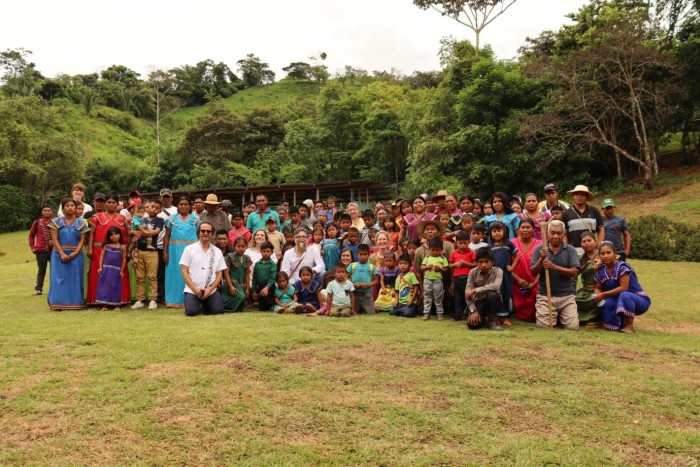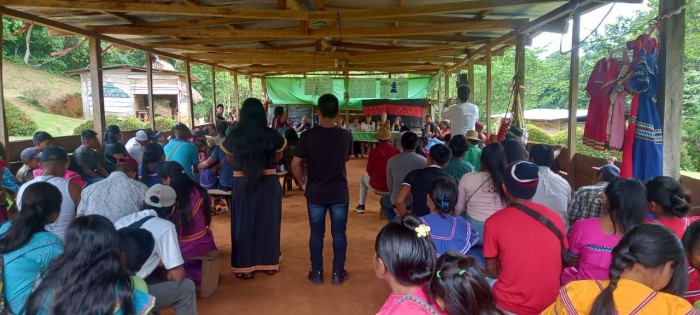Today, the four Indigenous Ngäbe communities in Panama of Kiat, Nuevo Palomar, Quebrada Caña and Quebrada Plata and representatives of M10, advised by SOMO, Both Ends and ACD, and the Development Finance Institutions of Germany (DEG) and the Netherlands (FMO), together announce that an agreement was reached in response to the complaint that was submitted in 2014 with the Independent Complaints Mechanism (ICM) of both FMO and DEG by the M10 movement and the Cacica General of the Comarca Ngäbe-Buglé.

The agreement consists of a public statement by FMO and DEG that can be found below, and a community program that aims to improve basic needs of the communities of Kiat, Nuevo Palomar, Quebrada Caña and Quebrada de Plata. The livelihoods and wellbeing of these communities are affected by the Barro Blanco hydro project that was partially financed by FMO and DEG.
The community program will focus on seven themes:
1. Drinking water and sanitation
2. Transportation and transportation infrastructure
3. Electrification
4. Cultural Preservation
5. Livelihoods
6. Scholarships and Education
7. Home improvements
During the dialogue process, the content of the community program was jointly developed and agreed upon, leading to a signed agreement in June 2025. All elements of this agreement were discussed and validated through a participatory process in each community.
In addition, the parties agreed to hire the FSC Indigenous Foundation to execute the community program. The Foundation has a history of working with indigenous communities in Panama and around the world, with a focus on empowerment and self-determination, foundational elements for the community program. Once initiated, the implementation of the program will last for two years, starting in July 2025. The costs for the community program are covered by DEG and FMO.
All parties look forward to the implementation of the Community Program. They appreciate the outcome of the dialogue process and believe that it generally follows the recommendations of the ICM.
For more information about the ICM process and its reports, please see here
Acuerdo entre FMO, DEG y las comunidades afectadas por el proyecto hidroeléctrico de Barro Blanco
Hoy, las comunidades de Kiat, Nuevo Palomar, Quebrada Caña y Quebrada de Plata y representantes del M10, asesorados por SOMO, Both Ends y ACD, y las Instituciones Financieras de Desarrollo de Alemania (DEG) y Holanda (FMO), anuncian conjuntamente que se llegó a un acuerdo en respuesta a la queja que fue presentada en 2014 ante el Mecanismo Independiente de Quejas (ICM por sus siglas en inglés) tanto de FMO como de DEG por el movimiento M10 y la Cacica General de la Comarca Ngäbe-Buglé.
El acuerdo consiste en una declaración pública de FMO y DEG que puede encontrarse aquí, y un programa comunitario que pretende mejorar algunas necesidades básicas de las comunidades de Kiat, Nuevo Palomar, Quebrada Caña y Quebrada de Plata. Los medios de subsistencia y el bienestar de estas comunidades se ven afectados por el proyecto hidroeléctrico de Barro Blanco, financiado parcialmente por FMO y DEG. El programa comunitario se centrará en siete temas:
1. Agua potable y saneamiento
2. Transporte e infraestructuras de transporte
3. Electrificación
4. Preservación cultural
5. Medios de subsistencia
6. Becas y educación
7. Mejora de viviendas
Durante el proceso de diálogo, se elaboró y se acordó conjuntamente el contenido del programa comunitario, lo que resultó en la firma de un acuerdo en junio de 2025. Todos los elementos de este acuerdo se trataron y se validaron mediante un proceso participativo en cada comunidad.
Además, las partes acordaron contratar a la Fundación Indígena FSC para ejecutar el programa comunitario. La Fundación tiene una historia de trabajo con comunidades indígenas en Panamá y en el mundo con un enfoque en el empoderamiento y la autodeterminación, elementos fundamentales para el programa comunitario. Una vez iniciado, la ejecución del programa tendrá una duración de dos años, a partir de julio de 2025. Los costos del programa comunitario son cubiertos por DEG y FMO.
Todas las partes desean que se implemente el Programa Comunitario. Valoran positivamente el resultado del proceso de diálogo y consideran que, en general, sigue las recomendaciones del ICM.
Para obtener más información sobre el ICM y sus reportes vea aquí.
-------------------------------
Statement of FMO and DEG to Kiat, Nuevo Palomar, Quebrada Caña and Quebrada Plata
Both FMO and DEG [as lenders] deeply and profoundly regret the negative impacts on the livelihoods and well-being of the Ngäbe people that occurred as a result of the construction and operation of the Barro Blanco Project which we partially financed.
The communities affected by this project experienced, and continue to experience significant loss to their territory, environment, ways of life, and to the places they hold sacred.
We wish to sincerely acknowledge the negative impacts caused by the construction and operation of the project, and to declare, again, our intention to help address some of the negative impacts the affected communities have endured, working in collaboration with those who have suffered, while respecting their sovereignty.
We present this statement as a sincere recognition of what has happened to the Ngäbe people. Until the dialogue process between the affected communities, FMO and DEG began, we had not effectively responded to the concerns and criticisms voiced since the beginning by them.
Since February 2022 our dialogue has helped us to better understand the impact of the project on your lives. As a result of this dialogue we jointly developed a community program, the costs of which will be covered by FMO and DEG.
We recognise that the community program will not resolve all the negative impacts, nevertheless, we hope that through the co-creation and implementation of the community program we will contribute to the restoration of some of the livelihoods and the wellbeing of those negatively impacted by the Barro Blanco project.
Note: This statement follows the completion of the Independent Complaint Mechanism Process (ICM process) on the Barro Blanco Hydroelectric Project in Panama. FMO and DEG were amongst the lenders to the company Generadora del Istmo S.A. (Genisa) which built and runs this Hydropower operation. FMO’s and DEG’s financing of the project ended in April 2021. The final Compliance Review Monitoring Report and the Management Response by FMO and DEG can be found here: Barro Blanco / 14-0002 | DEG
Declaración de FMO y DEG para (i) Quiabda; (ii) Nuevo Palomar; (iii) Quebrada Caña y (iv) Quebrada de Plata
FMO y DEG en su calidad de prestamistas, lamentan sentida y profundamente los impactos negativos a las formas de vida y el bienestar de la comunidad indígena Ngäbe afectada directamente- como resultado de la construcción y operación del Proyecto Hidroeléctrico Barro Blanco, que parcialmente financiamos.
Las comunidades afectadas por el proyecto tuvieron, y continúan viviendo, pérdidas significativas sobre su territorio, medio ambiente, formas de vida, y lugares que les son sagrados.
Es nuestra intención reconocer sinceramente los efectos negativos causados por la construcción y ejecución del Proyecto y declarar una vez más nuestra intención de contribuir a abordar los impactos negativos a los cuales han sido sujetos. Queremos lograr esto trabajando en colaboración con quienes han sufrido estos impactos, a la vez que respetamos su autonomía como comunidades indígenas.
Presentamos esta declaración pública como un sincero reconocimiento de lo que ha ocurrido a la comunidad Ngäbe afectada directamente por el proyecto Barro Blanco. Hasta el comienzo del proceso de diálogo entre las comunidades afectadas, FMO y DEG, no habíamos respondido efectivamente a las preocupaciones y críticas expresadas desde un inicio por parte de ellas.
Desde febrero 2022 nuestro diálogo nos ha ayudado entender mejor los impactos negativos del Proyecto en sus vidas. Como resultado de este diálogo desarrollamos conjuntamente un Programa Comunitario cuyos costos serán cubiertos por FMO y DEG.
Reconocemos que el programa comunitario no resolverá todos los impactos negativos, no obstante esperamos que a través de la co-creación e implementación del Programa Comunitario contribuyamos a la recuperación de algunos medios de subsistencia y el bienestar de quienes han sido impactados negativamente por el Proyecto Barro Blanco.
Nota: Esta declaración pública sigue la clausura del proceso de evaluación y cumplimiento del Proyecto Hidroeléctrico Barro Blanco (Panamá) por parte de Mecanismo de Quejas Independiente (ICM, por sus siglas en Ingles) de los bancos. FMO y DEG estuvieron entre los prestamistas a la compañía Generadora del Istmo S.A. (Genisa), la compañía responsable por la construcción y operación del proyecto. El financiamiento de FMO y DEG terminó en abril del 2021. El último reporte de monitoreo del ICM y la respuesta por parte de FMO y DEG a las recomendaciones de este se encuentra en nuestra página web [https://www.fmo.nl/complaints-disclosure. https://www.deginvest.de/Über-uns/Verantwortung/Beschwerdemanagement/Barro-Blanco/ ].




